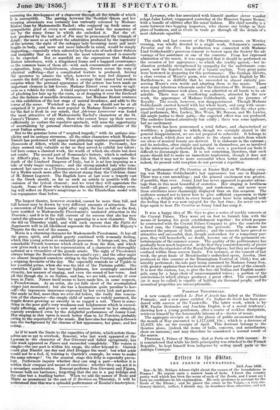The sixth and last concert of the Philharmonic season, on
Monday evening, was wholly devoted to a single work, Schumann's cantata, Paradise and the Peri. Its production was connected with Madame Lind Goldschmidt's generous consent to bestow upon the Society the ad- vantage of her assistance at one of the concerts. From her expressed admiration of the music, it was suggested that it should be performed on the occasion of her appearance ; to which she readily agreed,—her in- clination probably strengthened by sympathy for the unfortunate com- poser, now the hopeless inmate of a lunatic asylum. Very great' ains were bestowed in preparing for this performance. The German libretto, a close version of Moore's poem, was retranslated into English by Mr. Bartholomew, so skilfully that he succeeded in almost entirely re- serving Moore's own words and adapting them to the music. There were many laborious rehearsals under the direction of Mr. Bennett ; and when the performance took place, it was admitted on all hands to be a& mirable. There was an overflowing audience, attracted by the new work, the appearance of Madame Goldschmidt, and the presence of Royalty. The result, however, was disappointment. 'Though Madame Goldschmidt exerted herself with her whole heart, and sang, with unsur- passable vocal power, brilliancy, -and expression,—while the other prin- cipal performers, Mrs. Luckey, Mrs. Weiss, Mr. Benson, and Mr. Lawler, did ample justice to their parts,—the expected effect was not produced. The audience listened attentively but coldly ; there was some applause,' but no excitement.
The work has been pronounced a total failure, and characterized as' worthless ; a judgment to which, though we certainly shared in the general disappointment, we are not prepared to subscribe. It belongs to a new school, which does not adhere to the classic models from which our ideas of musical beauty are derived. It is elaborate in the extreme; and its melodies, often simple and natural in themselves, are so involved in the intricacies of orchestral details, that even a practised ear finds it difficult to disentangle them. It is not surprising, therefore, that such music should fail to make an immediate impression, though it does not follow that it may not be more successful when better understood—if, indeed, its present cold reception do not prevent a repetition.


























 Previous page
Previous page